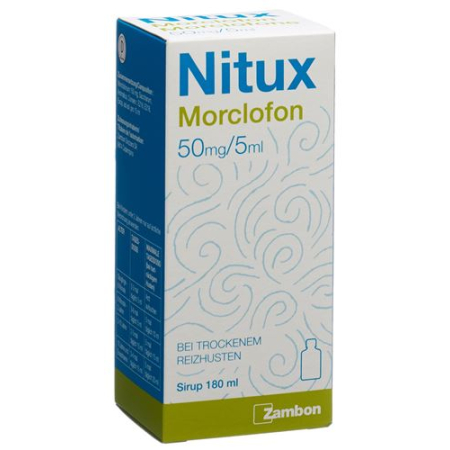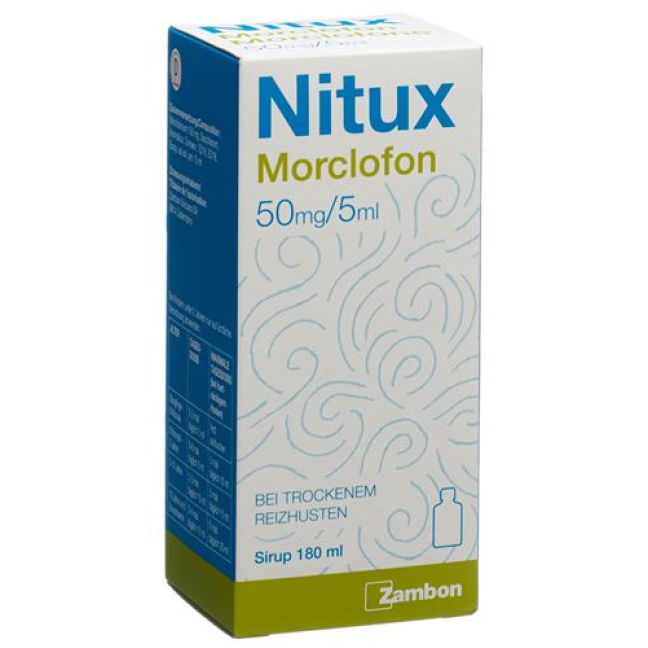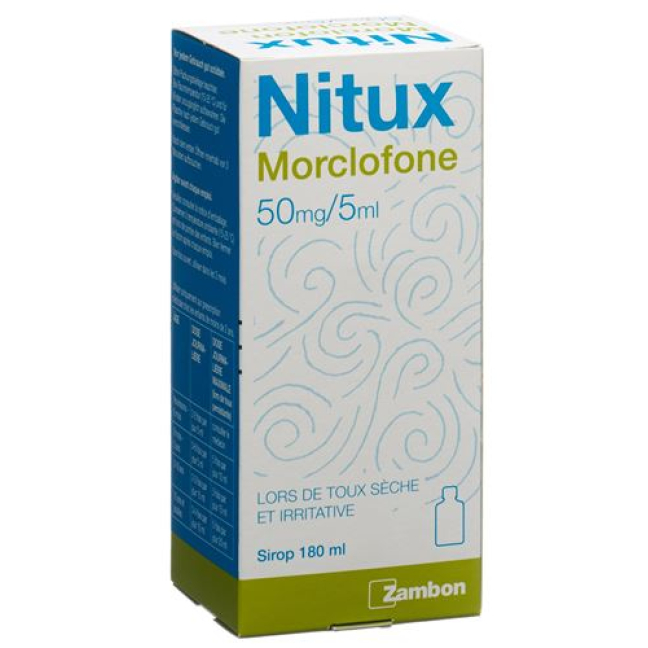Nitux Syrup: Morclofon-based Cough Medicine
Nitux Sirup Glasfl 180 ml
-
27.44 USD

- Availability: In stock
- Brand: ZAMBON SCHWEIZ AG
- Product Code: 879506
- ATC-code R05DB25
- EAN 7680423430214
Ingredients:
Description
Nitux syrup contains the active ingredient morclofon.
It is used to treat dry, irritating coughs of various origins, soothes the urge to cough and also relaxes the bronchial muscles.
Nitux Syrup is not a narcotic, morphine-like cough medicine. It usually does not cause fatigue, does not inhibit breathing, and does not cause constipation.
Nitux Syrup may only be used if prescribed by a doctor if you are under the age of 2 years.
Swissmedic-approved patient information
Nitux Syrup
What is Nitux Syrup and when is it used?
Nitux Syrup contains the active ingredient Morclofon.
It is used to treat dry, irritating coughs of various origins, soothes the urge to cough and also relaxes the bronchial muscles.
Nitux Syrup is not a narcotic, morphine-like cough medicine. It usually does not cause fatigue, does not inhibit breathing, and does not cause constipation.
Nitux Syrup may only be used if prescribed by a doctor if you are under the age of 2 years.
What should be considered?
Smoking can contribute to the development of a cough. By giving up smoking, you can support the effects of Nitux Syrup.
Diabetics need to be aware that the syrup contains sugar; 15 ml of syrup contains 7.5 g of sugar. This corresponds to 7.5 g of usable carbohydrates per single dose.
When shouldn't Nitux Syrup be taken?
Nitux Syrup should not be taken if there is a known hypersensitivity to the active substance Morclofon or one of the other ingredients according to the composition (e.g. in the case of a so-called paragroup allergy to the excipients E216 and E218) and in the presence of a rare congenital disease of the sugar metabolism (it is called fructose intolerance).
In addition, Nitux syrup must not be taken together with expectorants, as this prevents the liquefied bronchial mucus from being coughed up, which can lead to a dangerous congestion and promotes the occurrence of respiratory infections and bronchial spasms.
Your doctor will tell you what to do in such cases.
When should you be careful when taking Nitux Syrup?
If the cough does not decrease or disappears after 7 days of treatment, you should consult your doctor questions.
In children under 2 years of age, Nitux Syrup should only be used if prescribed by a doctor.
If you have a cough with heavy mucus secretion or sputum, you should use expectorants (so-called expectorants or mucolytics) instead of Nitux Syrup. The suppression of coughing caused by Nitux Syrup can lead to unwanted congestion of bronchial mucus in the airways. This favors the occurrence of a respiratory infection or bronchial spasm. Therefore, concomitant use of Nitux Syrup and expectorants should be avoided. In such cases, you should ask your doctor, pharmacist or druggist for advice.
The simultaneous intake of centrally depressant drugs (e.g. sleeping pills, sedatives) or alcohol should be avoided.
Excipients of particular interest
Nitux Syrup contains:
- 7.5 g sucrose per 15 ml syrup. This should be taken into account in patients with diabetes mellitus and/or if you know that you have an intolerance to sugars, please only take Nitux Syrup after consulting your doctor.
- 15.69 mg sodium ( Main component of cooking/table salt) per 15 ml of syrup. This corresponds to 0.8% of the recommended maximum daily dietary intake of sodium for an adult.
- Small amounts of ethanol (alcohol), less than 100 mg per 15 ml of syrup.
- 20 .25 mg methyl parahydroxybenzoate (E218) and 2.25 mg propyl parahydroxybenzoate (E216) per 15 ml syrup. These preservatives can cause allergic reactions, including delayed reactions.
Nitux Syrup may have an effect on the ability to drive and use machines.
Tell your doctor, pharmacist or druggist if you or your child
- suffer from other diseases,
- have allergies or
- take other medicines (including those you bought yourself!) or use them externally.
Can Nitux Syrup be taken while pregnant or breastfeeding?
If you want to have a child or are pregnant or breastfeeding, you should refrain from taking medicines as a precaution . In the case of Nitux, it is not known whether the active substance, morclofon, crosses the placenta and whether it can have undesirable effects on the unborn child or the child who is breast-fed. Therefore, you should not take Nitux Syrup during pregnancy and breast-feeding unless prescribed by a doctor.
How do you use Nitux Syrup?
Unless otherwise prescribed by your doctor:
Adults and children over 10 years of age:
15 ml 3-4 times a day (max. daily dose: 5 times 20 ml).
Children: Use under 2 years of age only on medical prescription.
Infants up to 6 months: 5 ml 2-3 times a day.
6 months to 3 years: 5 ml 3-6 times a day (max. daily dose: 5 times 10 ml).
3 to 10 years: 15 ml 2-3 times a day (max. daily dose: 5 times 15 ml).
Maximum daily dose only for particularly persistent coughs.
1 ml of syrup contains 10 mg of active ingredient. The ml of syrup are measured with the enclosed measuring cup. Shake bottle before each use.
Take Nitux Syrup after meals.
If the cough persists for more than 7 days, a medical clarification of the cause is required.
Follow the dosage given in the package leaflet or as prescribed by your doctor. If you think the medicine is too weak or too strong, talk to your doctor, pharmacist or druggist.
What side effects can Nitux Syrup have?
The following side effects can occur when taking Nitux Syrup: stomach upset, nausea, vomiting, occasionally headache or drowsiness. In some cases, the additives E216 and E218 contained in Nitux syrup can lead to hypersensitivity reactions with skin reactions, swelling of the eyes and nasal mucosa, palpitations, chills and other symptoms (so-called paragroup allergy).
If you get any side effects, talk to your doctor, pharmacist or druggist. This also applies in particular to side effects that are not listed in this leaflet.
What else needs to be considered?
The medicinal product may only be used up to the date marked «EXP» on the container.
Use by after opening
Close the bottle well after each use. Use within 3 months after first opening.
Storage instructions
Store at room temperature (15-25 °C) and keep out of the reach of children.
Further information
Your doctor, pharmacist or druggist can provide you with further information. These people have the detailed information for specialists.
What does Nitux Syrup contain?
Active ingredients
1 measuring cup of Nitux Syrup (15ml) contains 150 mg Morclofon
Excipients
Glycerol, methyl parahydroxybenzoate (E218), propyl parahydroxybenzoate (E216), sodium hydroxide, sucrose, simethicone, tragacanth, trimethylcetylammonium p-toluenesulfonate, tolu balsam, citric acid monohydrate, Citrus flavor (contains ethanol), purified water.
Approval number
42343 (Swissmedic).
Where can you get Nitux Syrup? What packs are available?
In pharmacies and drugstores, without a doctor's prescription.
Package: 180 ml bottle of syrup and measuring cup.
Authorization holder
Zambon Schweiz AG, 6814 Cadempino
This leaflet was last checked by the Medicines Agency (Swissmedic) in November 2020.





